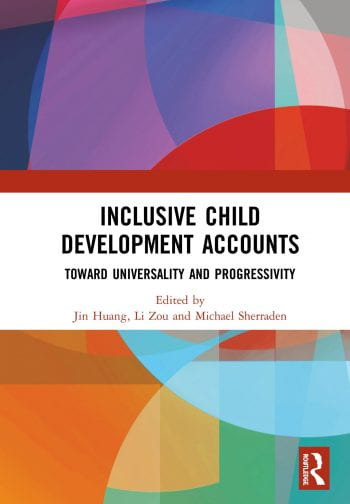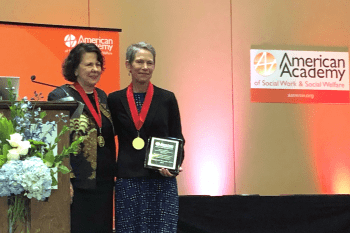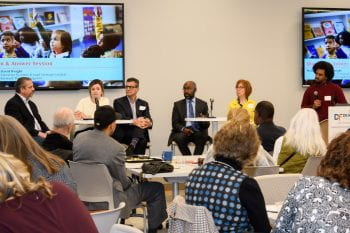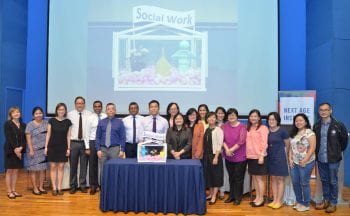Birkenmaier, J., Lane, L. B. Callahan, C.,, & Hageman, S. A. (2021). Teaching note—Course models for increased competency for practice integrated with financial capability and asset building. Journal of Social Work Education, 57(3), 604–611. https://doi.org/10.1080/10437797.2020.1714522
Tag: 2020
Adapting to Climate Change in the Upper Mississippi River Basin: Exploring Stakeholder Perspectives on River System Management and Flood Risk Reduction
Reed, T., Mason, L. R., & Ekenga, C. C. (2020). Adapting to climate change in the upper Mississippi River basin: Exploring stakeholder perspectives on river system management and flood risk reduction. Environmental Health Insights, 14. https://doi.org/10.1177/1178630220984153
Financial Capability and Asset Building in Social and Economic Development: Advancing the Sustainable Development Goals
Ansong, D., Okumu, M., Huang, J., Sherraden, M. S., Johnson, L., & Zou, L. (2020, November). Financial capability and asset building in social and economic development: Advancing the Sustainable Development Goals (CSD Perspective No. 20-27). St. Louis, MO: Washington University, Center for Social Development. https://doi.org/10.7936/vh44-x812
As nation struggles, conference sets sights on equity and financial inclusion

From across a nation struggling through the COVID-19 pandemic and a generally difficult year, over 150 scholars and practitioners gathered virtually on September 21 for “FCAB Policies: Race and Inequality in the COVID-19 Era,” Part 1 of the two-part convening “Financial Capability and Asset Building: Achievements, Challenges, and Next Steps.” They gathered to set an […]
Insights From State Treasurers: Developing and Implementing Statewide Child Development Account Policies
Leiker, C., Clancy, M. M., & Sherraden, M. (2020, October). Insights from state treasurers: Developing and implementing statewide Child Development Account policies (CSD Policy Summary No. 20-19). St. Louis, MO: Washington University, Center for Social Development. https://doi.org/10.7936/14tc-2b43
Volunteering and the Sustainable Development Goals: An Opportunity to Move Beyond Boundaries
Paine, A. E., Allum, C., Beswick, D., & Lough, B. J. (2020). Volunteering and the Sustainable Development Goals: An opportunity to move beyond boundaries. Voluntary Sector Review, 11(2), 251–260. https://doi.org/10.1332/204080520X15884252988018
International Volunteer Service
Lough, B. J. (2020, June). International volunteer service. In C. Franklin et al. (Eds.), Encyclopedia of Social Work. https://doi.org/10.1093/acrefore/9780199975839.013.959
Exposure to Community-Based Violence on Social Media among Black Male Emerging Adults Involved with the Criminal Justice System
Motley, R. O., Jr., Chen, Y.-C., Johnson, C., & Joe, S. (2020). Exposure to community-based violence on social media among Black male emerging adults involved with the criminal justice system. Social Work Research, 44(2), 87–97. https://doi.org/10.1093/swr/svaa002
An Analysis of the Educational and Health-Related Benefits of Nature-Based Environmental Education in Low-Income Black and Hispanic Children
Sprague, N., Berrigan, D., Ekenga, C. C. (2020). An analysis of the educational and health-related benefits of nature-based environmental education in low-income Black and Hispanic children. Health Equity, 4(1), 198–210. https://doi.org/10.1089/heq.2019.0118
Mental Health and Weather Extremes in a Southeastern U.S. City: Exploring Group Differences by Race
Mason, L. R., Sharma, B. B., Walters, J. E., Ekenga, C. C. (2020). Mental health and weather extremes in a southeastern U.S. city: Exploring group differences by race. International Journal of Environmental Research and Public Health, 17(10). https://doi.org/10.3390/ijerph17103411
Child Development Accounts in the COVID-19 Crisis: Lessons from the Great Recession
Sherraden, M., Clancy, M. M., Huang, J., & Beverly, S. G. (2020). Child Development Accounts in the COVID-19 crisis: Lessons from the Great Recession (CSD Research and Policy Report No. 20-11). St. Louis, MO: Washington University, Center for Social Development. https://doi.org/10.7936/c5dg-qz60
Inclusive Child Development Accounts: Toward Universality and Progressivity

Huang, J., Zou, L., & Sherraden, M. (Eds.) (2020). Inclusive Child Development Accounts: Toward universality and progressivity. Abingdon, UK: Routledge.
A Framework for Explaining Black–White Inequality in Homeownership Sustainability
Ren, C. (2020). A framework for explaining Black–White inequality in homeownership sustainability (CSD Working Paper No. 20-07). St. Louis, MO: Washington University, Center for Social Development. https://doi.org/10.7936/zryf-5d75
Center for Social Development study nominated for “Best Paper” award

A study from the Center for Social Development’s SEED for Oklahoma Kids (SEED OK) experiment has been nominated for an award given to the best paper published in the Journal of Consumer Affairs.
CSD’s Margaret Sherraden inducted into American Academy of Social Work and Social Welfare

Sherraden was among 19 fellows inducted into the academy on Jan. 17, 2020.
Child Development Accounts: A Policy Design and Opportunity for Azerbaijan
Huseynli, A., Sherraden, M., & Gottlieb, D. (2020, January). Child Development Accounts: A policy design and opportunity for Azerbaijan (CSD Policy Brief No. 20-02). St. Louis, MO: Washington University, Center for Social Development. https://doi.org/10.7936/bnqw-qn41
Training American Indian and Alaska Native Social Workers for Indian Country
Tovar, M., Thompson, K., & Billiot, S. (2020). Training American Indian and Alaska Native social workers for Indian country. Journal of Evidence-Informed Social Work, 17(1), 75–89. https://doi.org/10.1080/26408066.2019.1629557
Missouri considers a Child Development Account for every newborn

CSD research and expertise shape proposal for a universal policy in the Show-Me state.
Missouri coalition sets sights on Child Development Accounts for all state newborns

An expanding partnership is pursuing legislation for Missouri children in 2020.
The Financial Capability and Financial Well-Being of Low-Income Entrepreneurs
Huang, J., & Guo, B. (2020, January). The financial capability and financial well-being of low-income entrepreneurs (CSD Research Brief No. 20-01). St. Louis, MO: Washington University, Center for Social Development. https://doi.org/10.7936/fmxv-kv62
Singapore’s Financial Capability and Asset Building Project Expands to Nationwide Scale

Singapore initiated training in Financial Capability and Asset Building in 2017. It is kicking off its third phase: expanding to a nationwide scale.